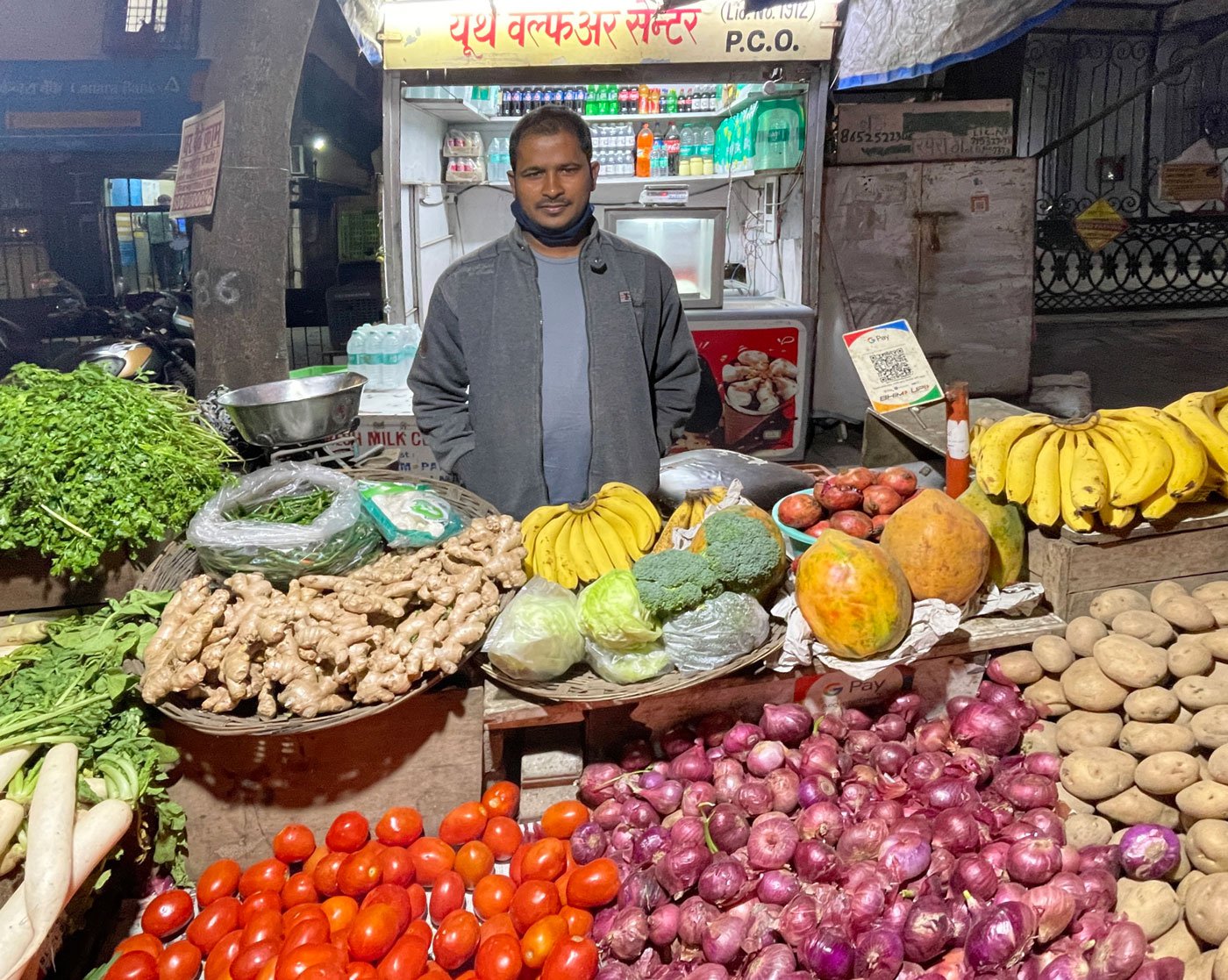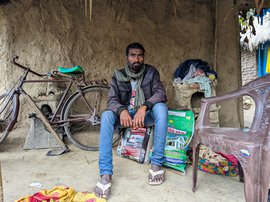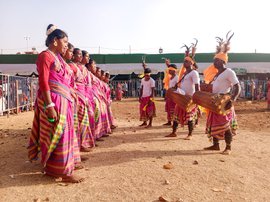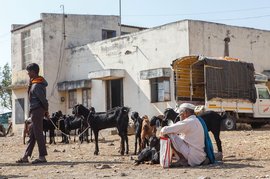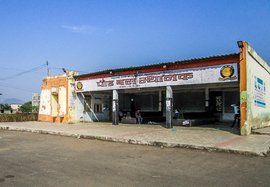In 2020, when lockdown was announced because of the coronavirus, I received word from my village that dada , my grandfather, had broken his leg from a fall. It was rare to find a doctor at the community health centre, and private clinics in the vicinity were shut because of corona. My family somehow put a plaster on the broken leg and took care of dada at home. But he suffered bouts of high fever and would scream out in unbearable pain. He got weaker and weaker, and took his last breath at the end of May that year.
I was in Mumbai when it happened. With things coming to a standstill suddenly, it was as if everyone was hit by a storm. Fear of the pandemic was growing all around, but on the streets, the police were raining batons. Livelihood had come to a halt, and migrant workers were heading back to their villages. I stayed on in Mumbai because I sold vegetables for a living, and we had been allowed to work. But when I heard that my dada passed away, I wanted to leave immediately for my village in Jaunpur district of Uttar Pradesh. I had shared an emotional bond with him. Besides, other than my mother there was no other responsible person there to take care of things.
Those were difficult times. News from all over the country was shattering. Some workers walking towards home fell asleep on a railway track out of sheer fatigue – and a train passed over them, crushing them. A mother, with her nursing baby in her arms, was walking without food or water. After dada died, I packed my bags and went to the nearest train station, in Andheri (West), to enquire about trains to go home. I found out there that the train to Allahabad was not running. News was coming in that two dead bodies were discovered from a train at Varanasi. And a train that was to go to UP left for Odisha instead. I had to travel 70 kilometres beyond Allahabad [called Prayagraj now] to reach my village. These incidents sapped my already weakened morale. One could travel by taxi, but it cost 40,000 to 50,000 rupees. I could not afford that, so I dropped the idea of going home altogether. There was no other option.
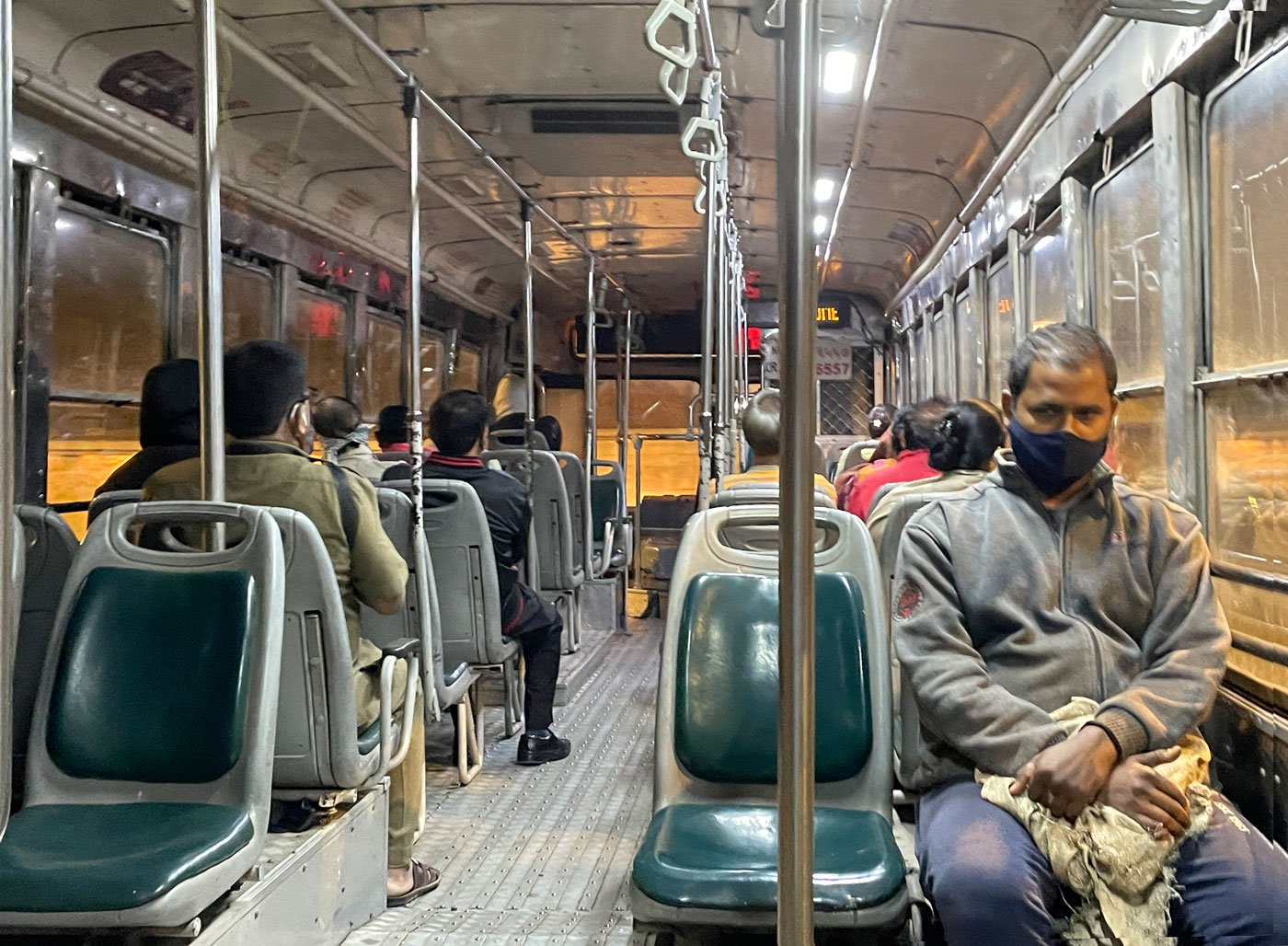
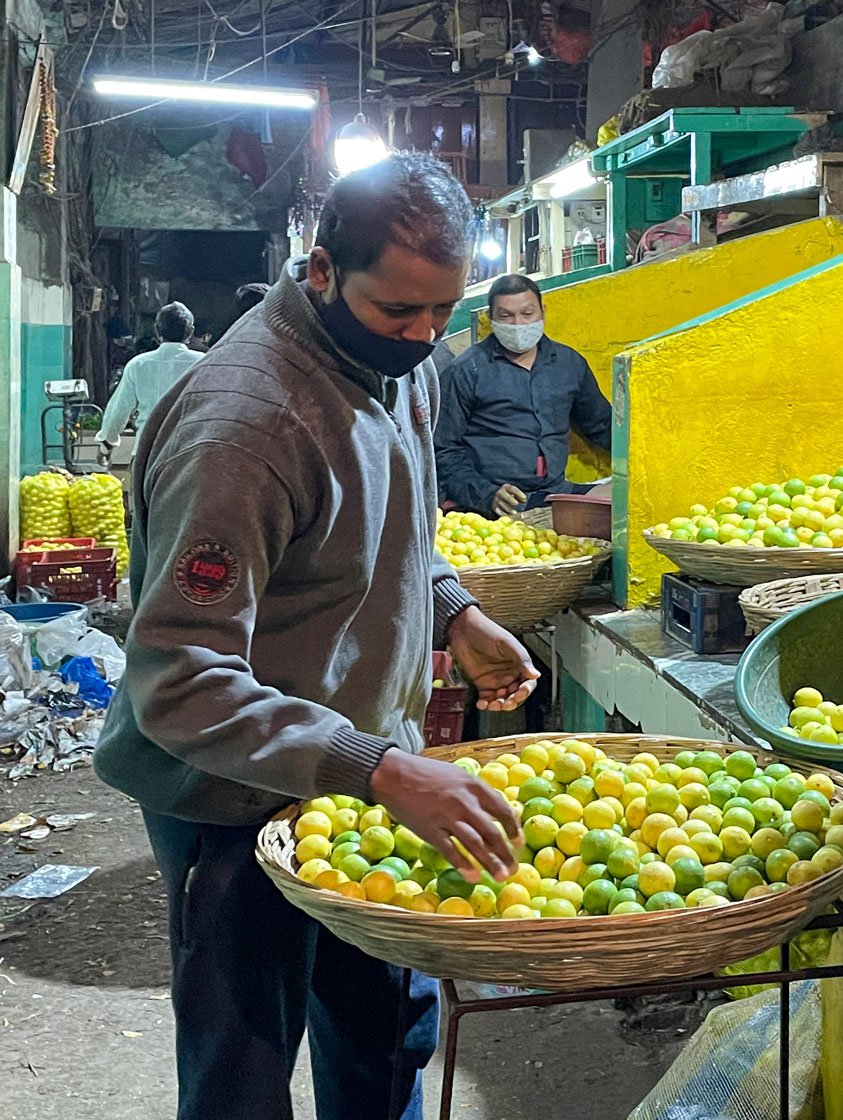
Left: Mithun Kumar (facing the camera) in a BEST bus, on his way to the vegetable market
. Right: Inspecting lemons at the
mandi
in Dadar, Mumbai
For the last rites, dada was taken to Jhunsi town in Allahabad district. Ma says vehicles were not being allowed to ply and the police were asking all kinds of questions. In fact, funerals had been prohibited at the cremation ghats in many places. Dada ’s last rites were somehow completed under the shadow of fear.
Incidentally, I was born in Mumbai, but my childhood was spent in Jaunpur and I went to school there. Papa , my father, had come to Mumbai in 1975 or thereabouts, at the age of 15. The move to Mumbai, however, was not so easy for him. He’d lost his mother soon after he was born. In the name of employment, his father, my dada , laboured in other people’s fields. He also made clay pots and roof tiles. There was no other work. He did not earn enough from ploughing and hoeing others’ fields to feed his whole family. For clothing, men of the family wore a dhoti -like short piece of cloth, called bhagai , which covers just the genitals. There was no wheat or rice for food. Bajra , maize, potato and mahua , which grew in the fields nearby, were the main sources of food.
*****
It is needless to clarify in whose homes my
dada
worked
– who owned land and who laboured.
Dada was often not paid for his hard work. He was told his ancestors’ debts were still pending, and he must repay them first. “Your grandfather had borrowed this much, this much of your great-grandfather’s dues are pending…” It is perhaps needless to clarify in whose homes my dada worked – who owned land and who laboured. My father, when he was a little grown up, went to live with the family for whom my dada worked. As a motherless child, and with dada himself struggling, there was no one to look after my father and his older brother. Papa lived with those people doing whatever work he was given to do in their home and their fields. And when there was no work, he would set out to graze their cows and buffaloes. As compensation for all this, he got some food to eat. This was his only wage. Papa says he didn’t have the option to leave.
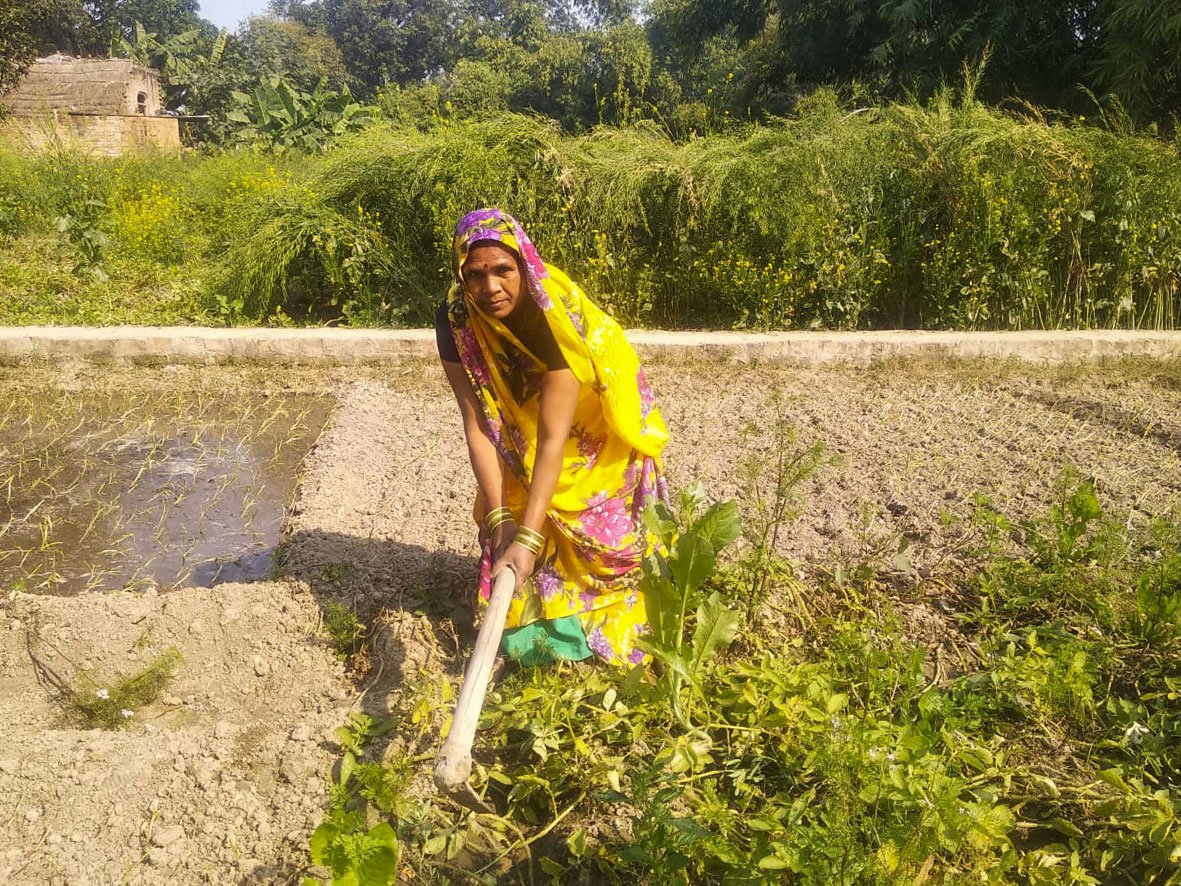
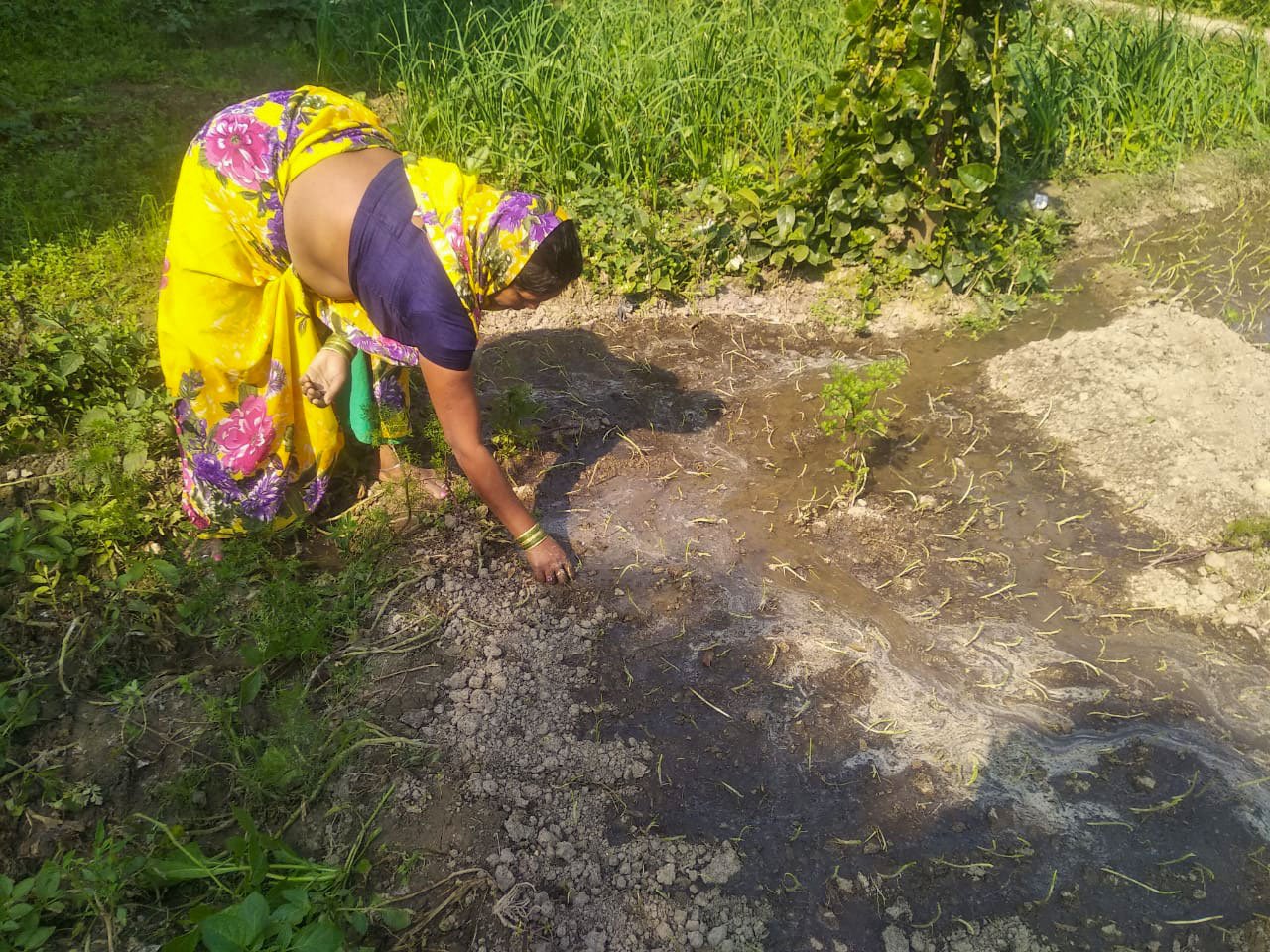
Mithun's mother working in the fields in their village in Jaunpur district, Uttar Pradesh. About 30 years ago, she used to shuttle between the village and Mumbai, when her husband was selling vegetables in the city
A neighbour of ours had come to Mumbai in 1970 and started selling bananas. A couple of years later, with his help, my bade pitaji , papa ’s elder brother, came to Mumbai and joined him in the business. He soon set up his own business selling bananas. And when he came back with a bit of money, our home was lively for the first time. He was to take my father with him when he returned to Mumbai. But the family in whose house my father worked found out and picked a fight with our neighbour. They accused him of instigating and corrupting ‘their man’. The matter escalated quite a bit and even got physical. Both families received threats, but everyone was determined, so they left for Mumbai. It was the first step towards unshackling the chains of bondage. At times it is unbelievable that this was happening merely 40-50 years ago, in a free nation.
After working with his elder brother for some time, papa started his own fruit shop. Circumstances improved, so his wedding was arranged in the village. Ma stayed there for a while and then started shuttling between the village and Mumbai. She would spend some months of the year with papa in Mumbai and then go back. I was born in that period, in 1990, at Cooper Hospital in Mumbai’s Juhu area.
Mummy belonged to a better-off family. Her father, my nana , owned some land, and both my mama s [mother’s brothers] were educated. About 40 years back, it was considered an achievement that they had studied up to Class 12. Apart from this, their political inclination, ideas and perspectives on society, were all modern. But in this patriarchal society, no matter how much things improve for men, women’s share of struggles is never-ending. The lives of my mother, her sisters and sisters-in-law were spent working in the fields.
My mother was married once before, into a family of similar economic status. But she came back to her parents’ home after some time. I don’t fully know why, but from what I’ve heard it was probably because of her skin condition. I never tried to find out. She lived with her father and brothers for a few years after that, and was married off again, to papa . It was simple: papa ’s family was not in good financial condition, so there was no reason to refuse a proposal from one that was better off.
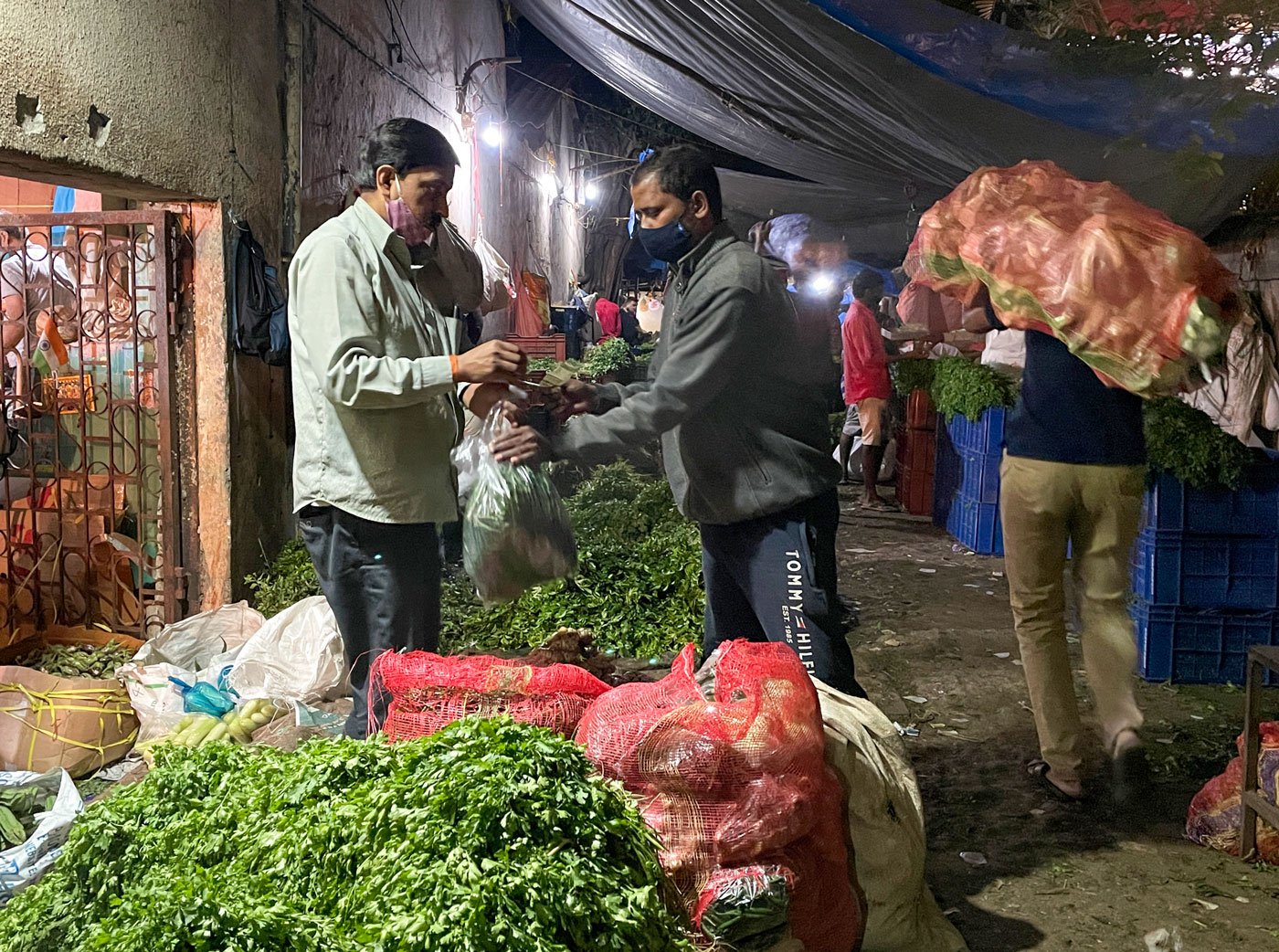
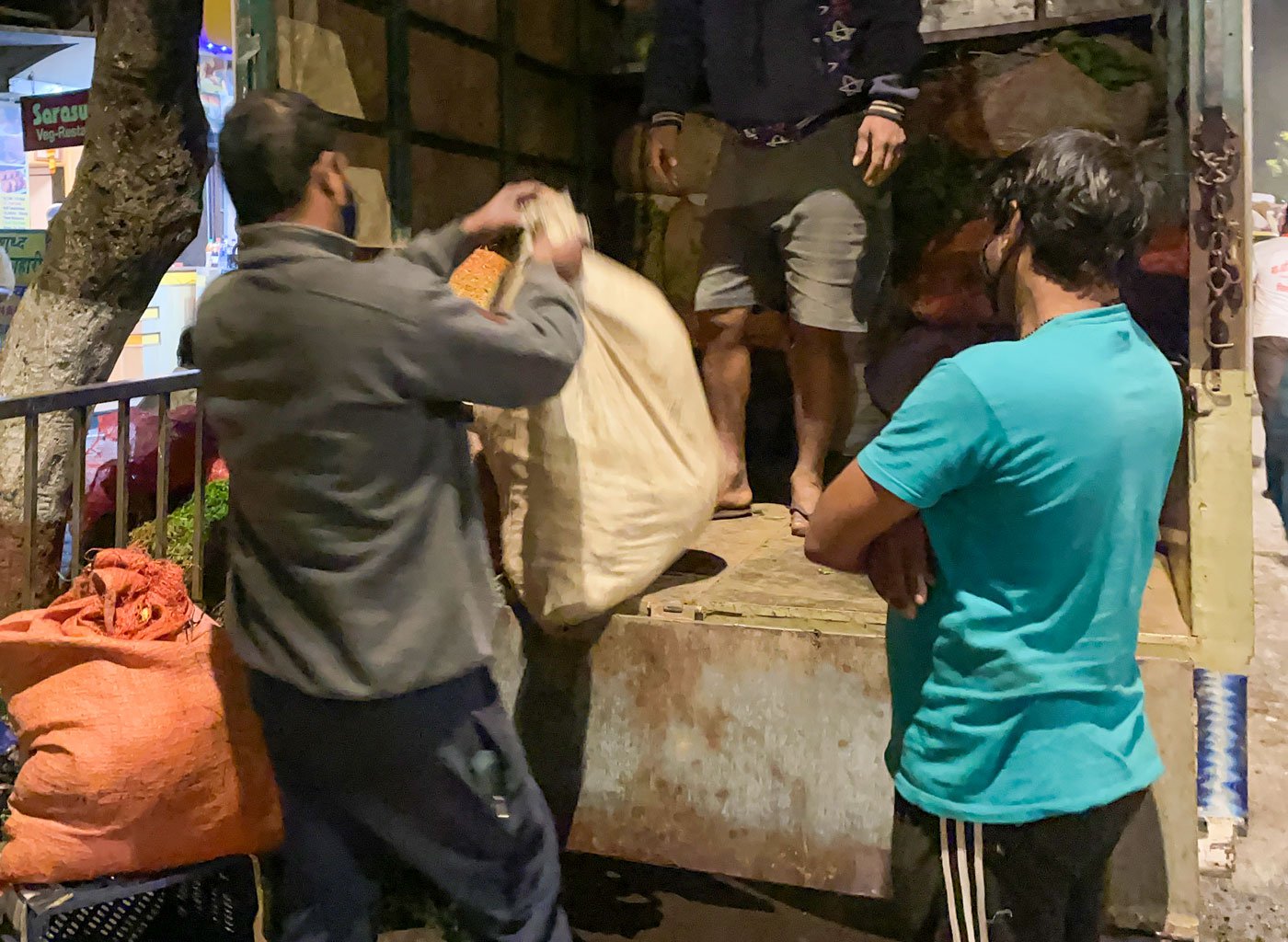
Mithun goes to the Dadar vegetable market at 4:30 every morning and loads his purchases in a tempo (right) that delivers it to his shop
Papa ’s shop was doing well until I was born. But he lost it later because of some problems, and had to restart the business from a rented shop. Eventually, after the five of us children were born, ma ’s trips to Mumbai almost stopped. She started working in the fields that dada rented in the village for sharecropping. She also helped prepare the clay used in making clay pots. But because of financial stress, discord within the family grew so much that my mother took all five of us brothers and sisters and started living separately. She had nothing in hand except a kuchcha house, a few utensils, and some grain. However, her brothers helped us out a little and set us up with rations in the beginning. Then my mother started cultivating – as a sharecropper – land that belonged to savarna s [caste Hindus] of the village. The result of my mother’s labours was that within a year or two there was enough food in the house. She also started working in other people’s houses. It was only because of her hard work that our food and clothing improved.
The next time papa came home, ma sent me to Mumbai with him. It was sometime in 1998-99, and I must have been 8 or 9 years old. She’d hoped that I’d give up my vagrant ways in Mumbai and help out my father in the shop. Meanwhile, papa had been moving the shop from place to place. Either business was not good somewhere or there was excessive action by the BMC [Brihanmumbai Municipal Corporation]. He didn’t have a fixed workplace. But he gave in to pressure from some people and enrolled me in a municipal school. Based on my age, I was admitted to Class 3. I met new children there and started feeling drawn to school again.
*****
Circumstances did not allow me to take 3-4 years off to study.
So I decided to let that dream go.
Papa would head out to the vegetable market in the morning. I would have some milk and biscuits, then take some cash in hand and leave for school at 7 a.m. When it was time for lunch, at about 10 a.m., I would eat samosa or a vada , or whatever was available in the school canteen. On my return home at noon, I would follow papa ’s instructions and cook food on a kerosene stove. He would usually tell me the method of making dal rice or some khichdi before he left. I used to cook based on whatever my nine-year-old brain could grasp. Sometimes the rice would turn out watery, or get burnt at the bottom, or remain half-cooked. I would pack a tiffin box after finishing the cooking and catch a BEST [civic transport] bus to his shop, five kilometres away. He would often shout at me while eating, saying, “What have you made? Is this what I told you to do? You’ve ruined it,” and so on.
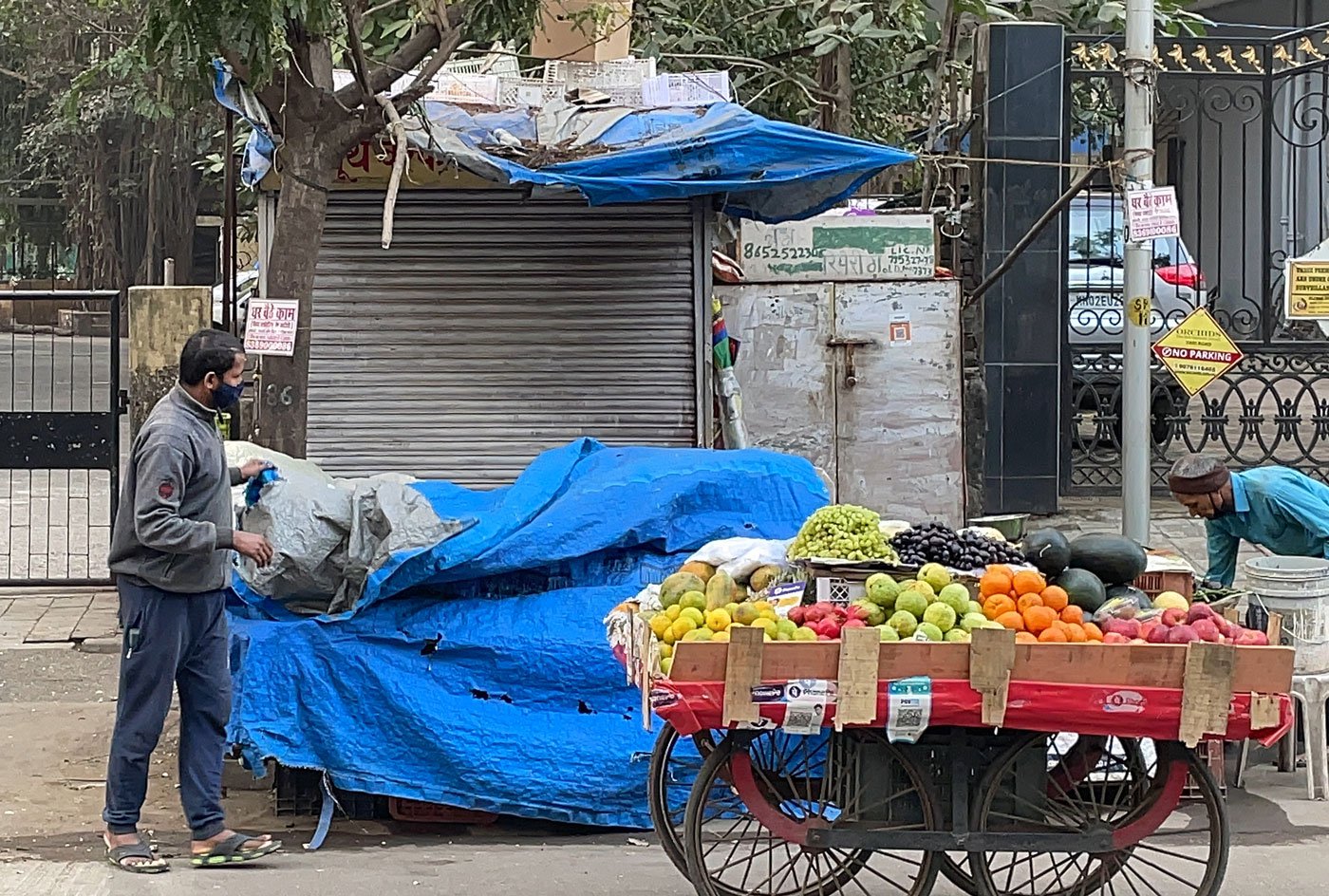
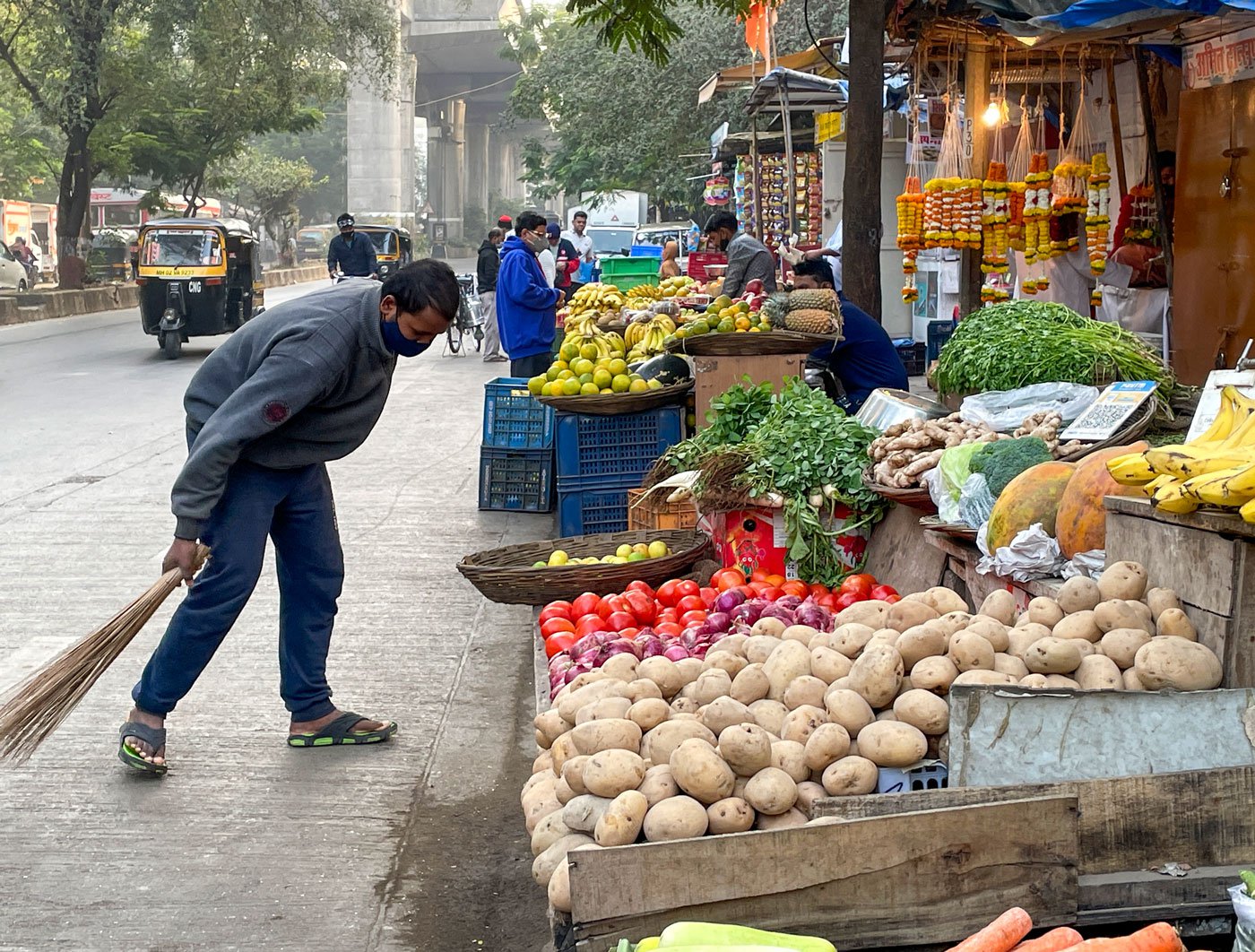
Left: Mithun opens his roadside vegetable shop at about 6:30 a.m. Right: He then cleans the area in front of it
In the afternoon, papa would sleep on the footpath floor, and I would handle the shop. But that was not all. After he’d wake up in the evening, I would go to sell green coriander and limes in the nearby lanes. I had learnt the art of selling to passers by, keeping bundles of coriander locked on my left wrist and holding limes in both my palms. I earned 50 to 80 rupees every day from selling the coriander and lime. This went on for about two and a half years. Then all of a sudden, papa had to go back home, so I had go with him. My schooling stopped midway through Class 5.
This time ma held me back in the village. She believed education was necessary and that at least one of her children studied. Perhaps the reason she stopped me from going back was because of my struggles in Mumbai. I never tried to find out, nor did she check where I’d like to live. She did what she thought was better for me.
The atmosphere in my mama ’s house was more conducive for studying, so my mother had a word with her brother, and I went to live in his house at age 11. All the children there went to school; it was the first time I had such a setting for learning. My mama s were associated with the Communist Party, so the mood around me was often political. It was there that I heard the names of political parties and regional leaders for the first time. One afternoon, our neighbour, ‘uncle’ to us and ‘comrade’ to others, was at the doorstep with a bunch of red flags. On prodding, I was told it was the Communist Party flag – the flag of peasants and workers. They were all going to a demonstration to protest against government policies. For the first time ever, I understood that it was possible to resist the government.
After I passed Class 12 exams in 2008, my uncle suggested that I prepare for the entrance exam to a polytechnic diploma course. When I discussed it with my mother, she said conditions at home were not the same as before. Despite her rejecting the idea, my mama submitted the application. I didn’t rank well at the first attempt. I tried again the next year. At the end of my yearlong effort, my rank was good, and I got into a government college this time. The counselling letter [for admission] also arrived, and the full year’s fee was Rs. 6,000. I asked my mother once more, but she turned me down. Mama said, “we’ll see”. But ma restated that my sisters were growing up and papa was not able to earn like before. How would we manage? She was right. Circumstances did not allow me to take 3-4 years off to study. So I decided to let that dream go.
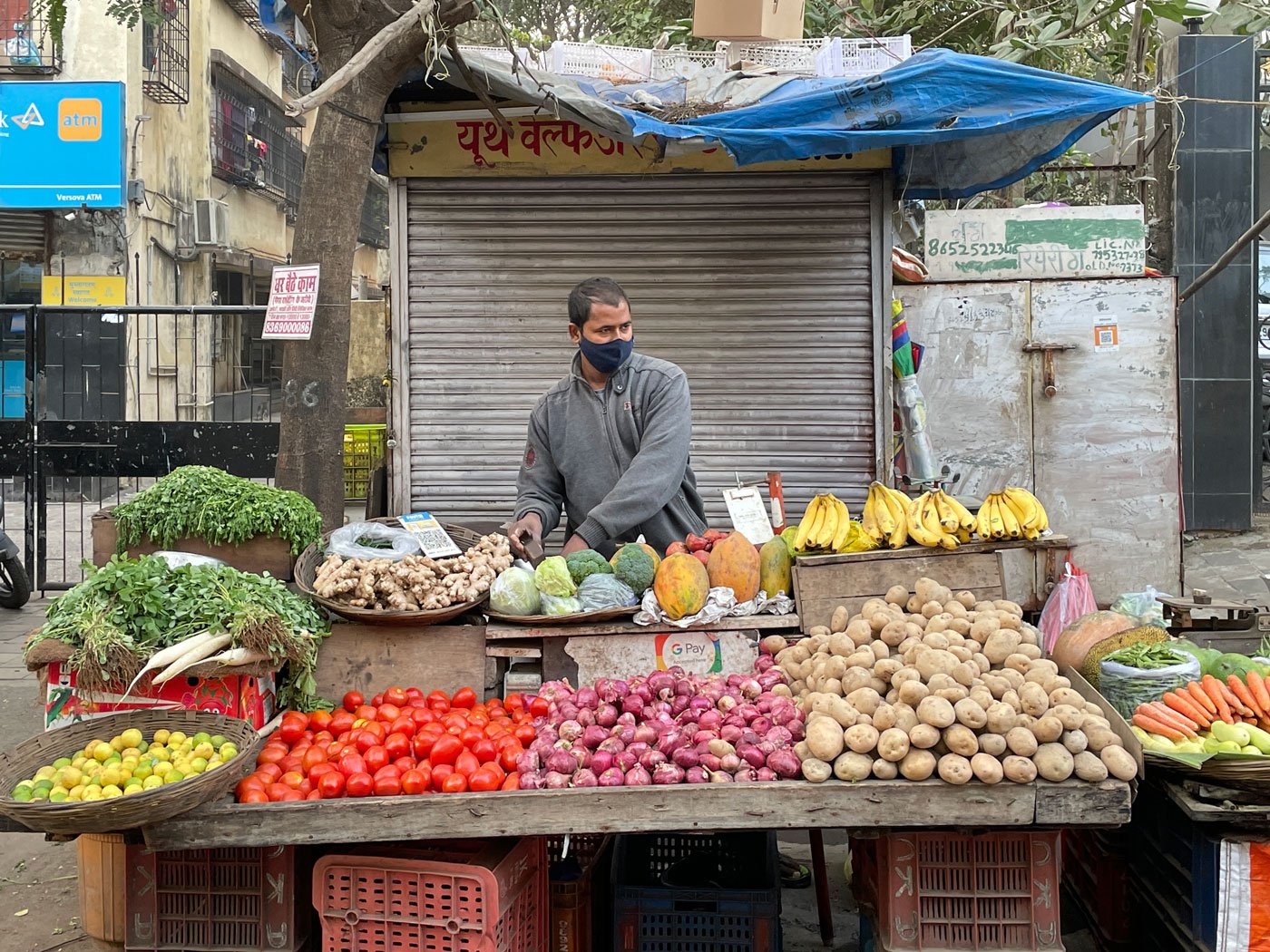
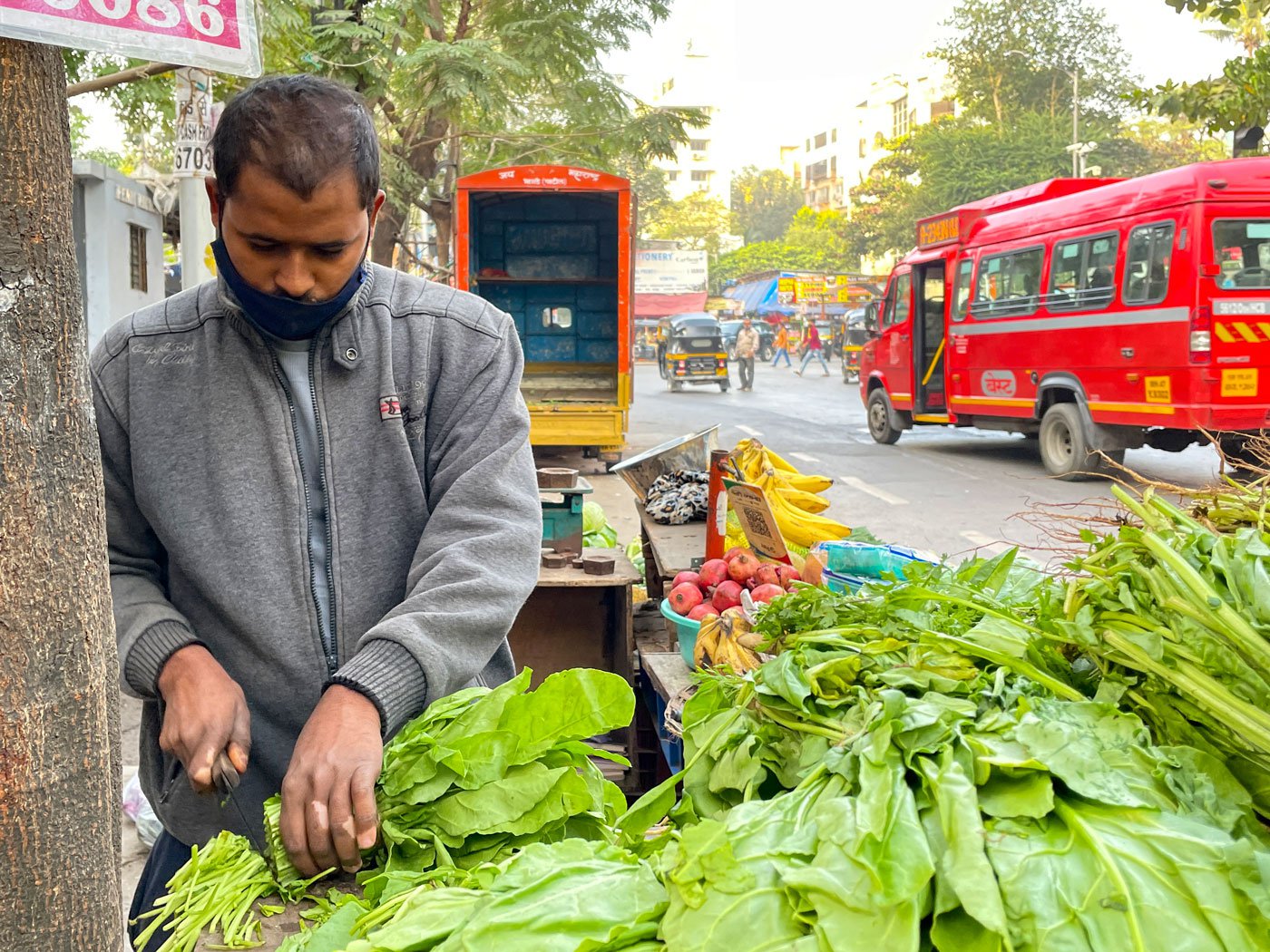
Left: He arranges the vegetables before his customers arrive. Right: Chopping the ends of a bundle of spinach before placing it for sale
Many times after that, I got on my bicycle and went looking for work in market areas far from the village. I tried finding jobs in places where no one knew me; I was hesitant to ask the people I knew. Anyway, I got a tutoring job in the process. But within 2-3 months, I realised that I was not being paid the full amount. I was upset. I thought of going to Mumbai. Papa was also there, so I would find some job or other. Ma also agreed. Then, one day, I came away to Mumbai with the son of the same neighbour who brought papa ’s brother here the first time.
*****
The job hunt started again. With no fixed place to stay,
I spent the days looking for work…
In Mumbai’s Andheri (West) area, where papa ran his vegetable shop, he cooked and ate his meals in a corner of the footpath, and also slept there. It was difficult to stay with him like this. I found work in a milk shop. The shop owner said I had to just oversee the shop, sometimes deliver goods to a few places, and live and work there. I had to work all days of the month without any leave, and the monthly salary would be 1,800 rupees. I accepted his offer. However, within a week, both my legs swelled up suddenly. The pain was unbearable. I felt relief only when I sat down. After about 20 days, I told my employer I could not work beyond the end of that month.
The job hunt started again. With no fixed place to stay, I spent the days looking for work, and I would sleep at a bus stop or outside a shop. Finally, I got a job in a lottery shop, where people came to place bets. I had to write the lottery numbers on a board, and was paid 80 rupees per day. Once, my boss himself placed some bets and lost almost 7 lakh to 8 lakh rupees. The shop didn’t open for two days after the debacle. On the third day, I was told that my boss had been beaten up by his boss, and the shop would remain shut until another person took charge. But the new boss never came. The 1,000 rupees that were due to me sank. Once again, I was out on the streets and looking for work.
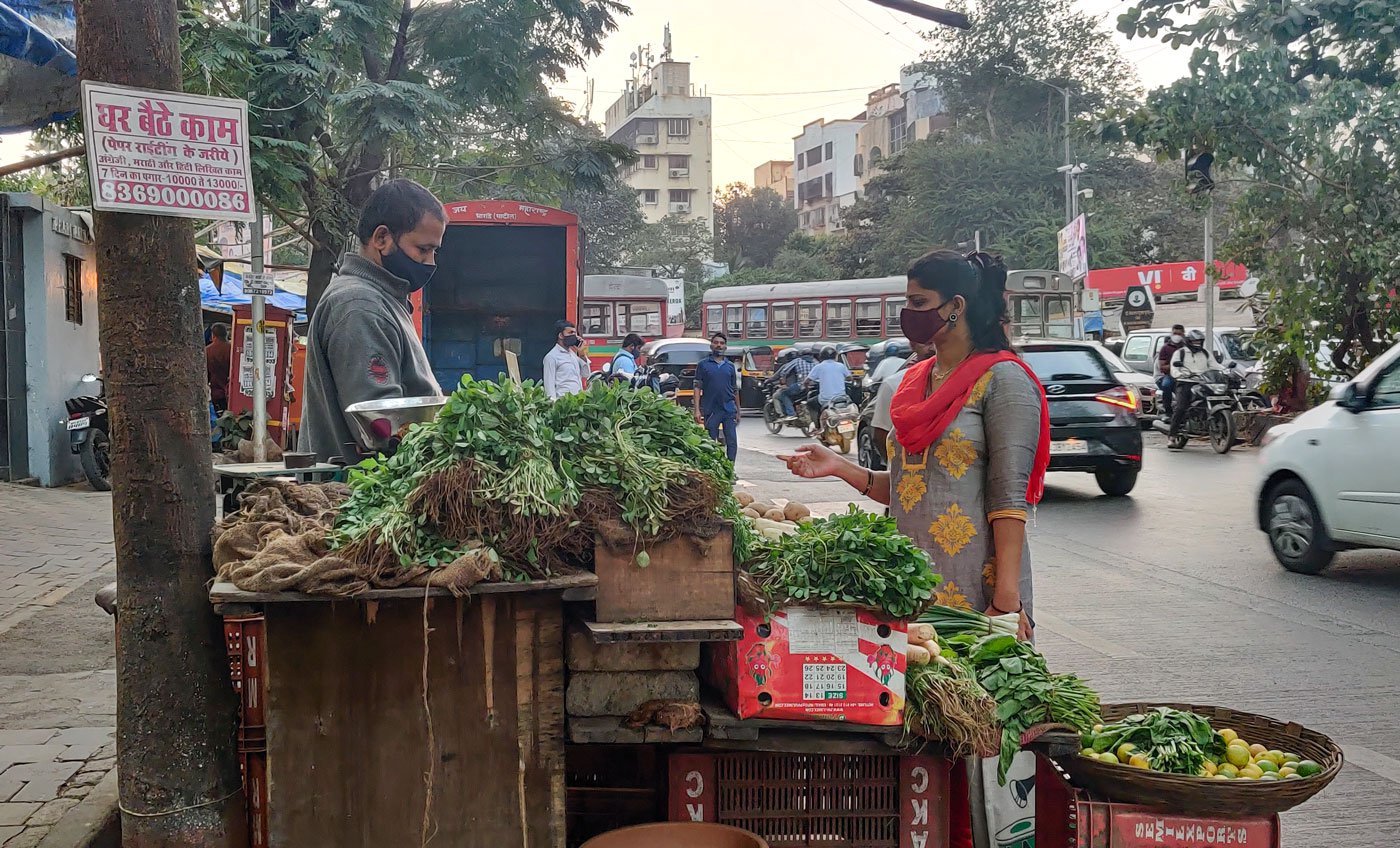
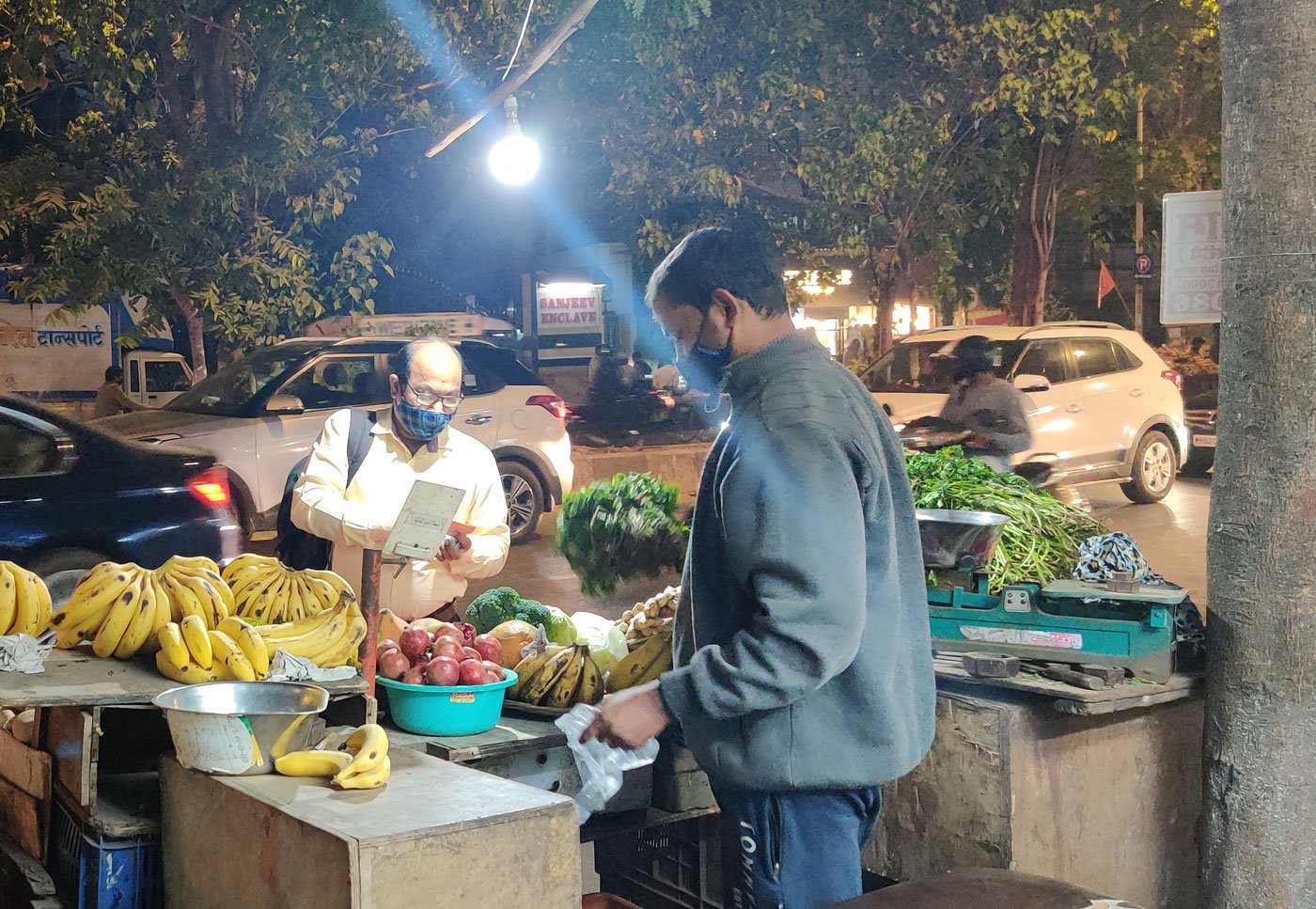
Many of Mithun's customers are regulars and some have even turned friends. He has been vending vegetables in Mumbai since about 2008
Meanwhile, papa ’s legs started giving him trouble. I told him that he should go back home and let me handle the shop here. At first he said that I wouldn’t be able to manage, and that life on the street was full of problems. But he did want to go back, and so I managed to convince him to let me run the business.
Within a week of taking over, I saved about 1,500 rupees. This was a big sum for me; it evoked a feeling of dedication towards the work. I saved 5,000 rupees after slogging for a month. My mother was delighted when I sent a postal money order home. And my father was surprised that I had saved so much where he had failed.
Across the road from where I vended, there was another vegetable shop run by a young man of about my age. We slowly became good friends. I remember the first time he offered me a plate of food. His name was Amir. After becoming friends with him, I was no longer stressed about food. Now Amir asked me what to cook every day. I didn’t know cooking, so I would clean the dishes after we ate. Where we slept on the street, out in the open, money started getting stolen. Once, someone took a mobile phone that was kept in the pocket. So after a few days, Amir and I decided to rent a room. An acquaintance found us a place in a chawl nearby. We had to pay a deposit, and the rent was 3,000 a month, which Amir and I shared.
Our home in the village was a
kuchcha
structure. A fire had damaged it some time ago. It was in a weak state despite the repairs done to it. So we were constructing a new house in its place, on that same plot. Around that time, in 2013, I started feeling a strange sort of pain in both my legs. I met the doctor at the village community health centre, who said that it was because of calcium deficiency. He prescribed several tests when my condition didn’t improve. The reports showed that it was polio. In spite of the treatment, my health was declining. And because there was no relief, my family kept going to
ojha-sokha
[faith healers and witch doctors]. Money was being spent on both,
dava
and
dua
[medicines and prayers]. But there was no succour. All my savings were spent. Looking at my state, some relatives chipped in. I returned to Mumbai then.
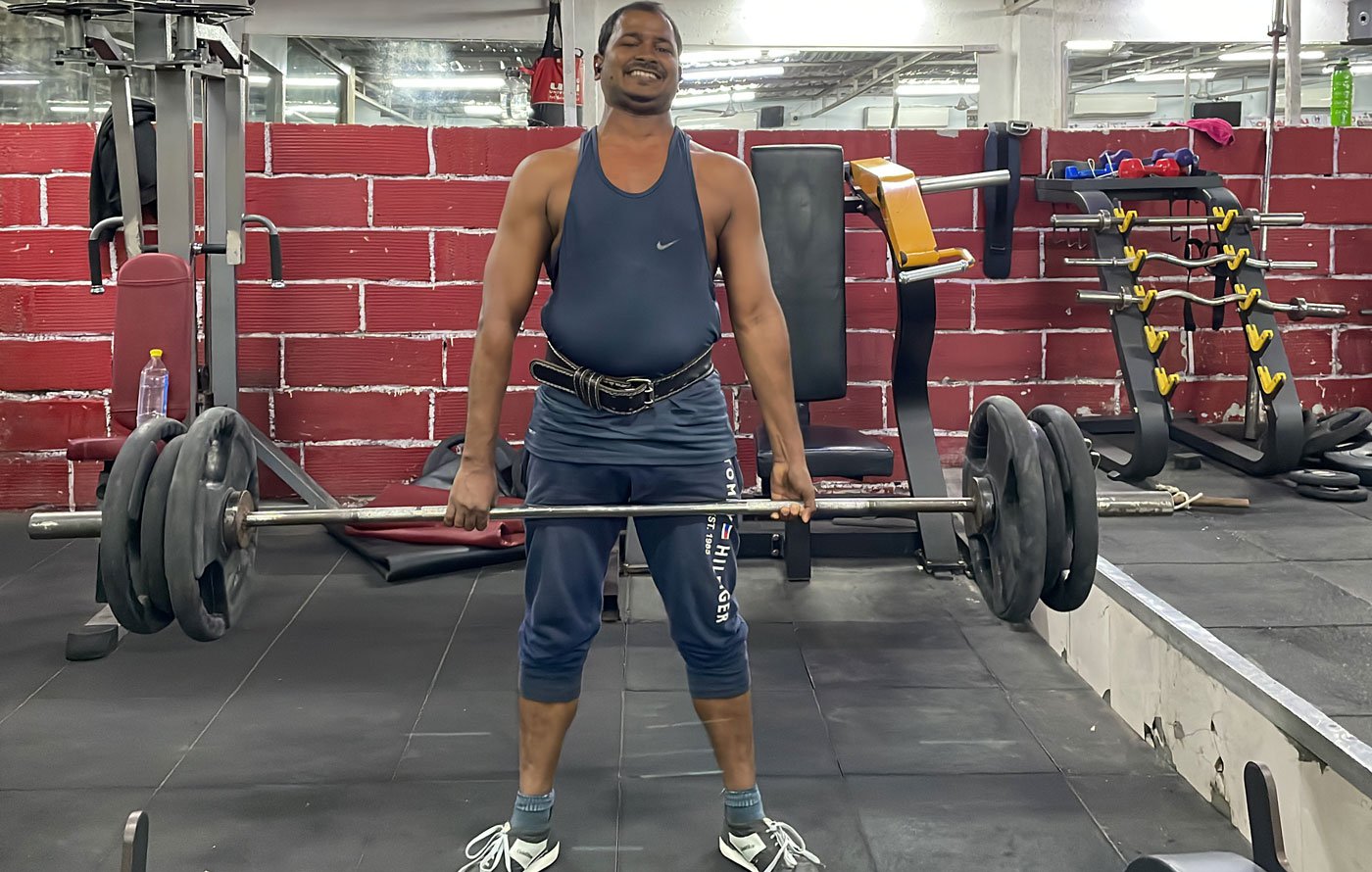
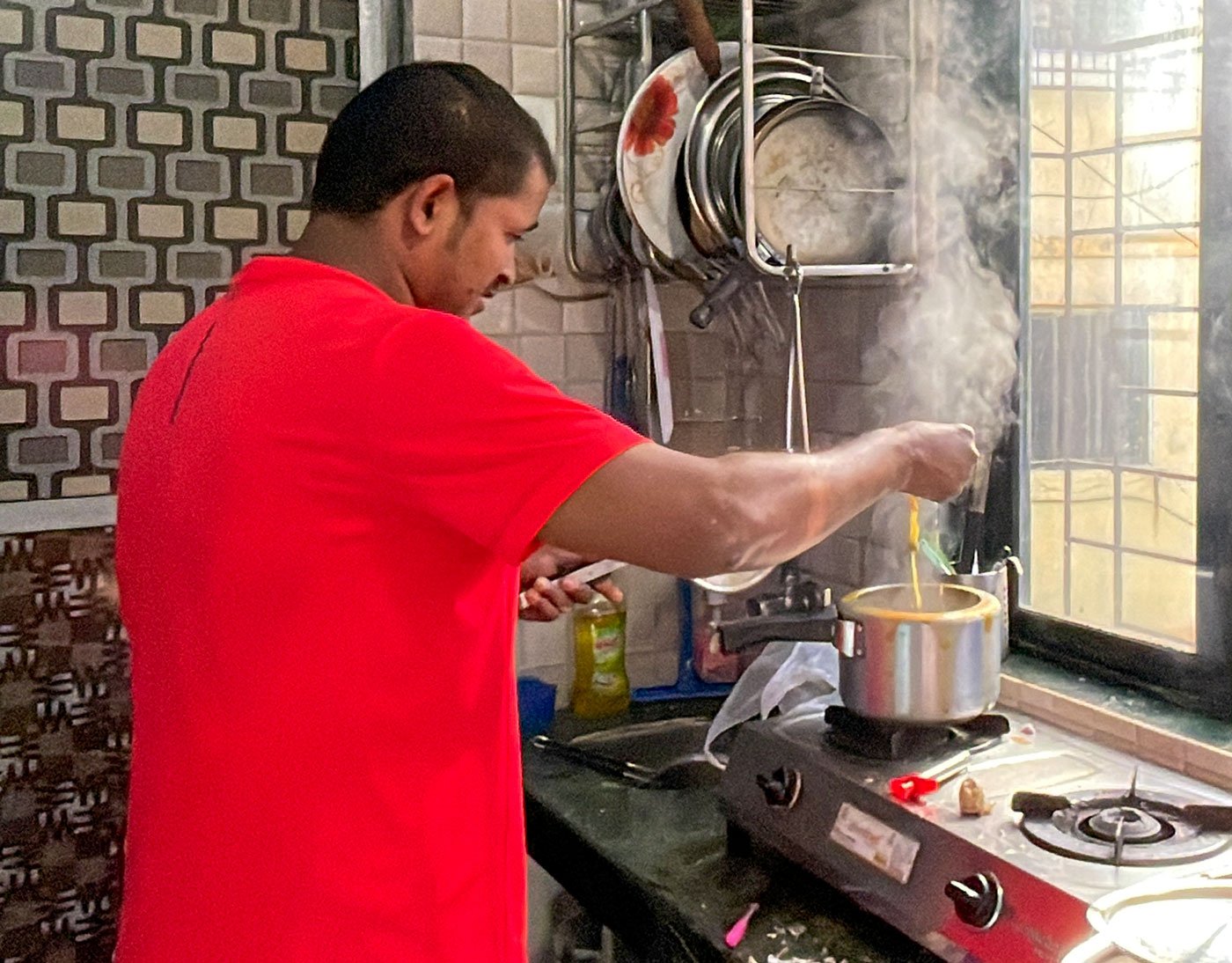
Left: He works out regularly at the gym, which surprises many people, he says. "Don't vegetable vendors have the right to be healthy?" Right: Cooking at home
But my mind was plagued by with all kinds of thoughts. Sometimes I felt like I was in my village, and sometimes I felt like I was in Mumbai. Kavita Malhotra, a customer turned friend, became worried when she found out about this. She was a teacher by profession. She took me to doctors she knew, and even paid their fees. Amir took me to a dargah after being goaded by others. People tell me that sometimes I would strip off all my clothes and start running helter-skelter. Then, one day, with an acquaintance’s help, papa brought me back to the village by train. I was taken to doctors and healers again. People would refer us to doctors in Allahabad, and a Bolero [pickup truck] would be booked – and ma would set out with me in it. She didn’t have any money at all; some relatives helped out financially. My weight was down to 40 kilos. Lying in bed, I looked like a bag of bones. People said there was no hope of my survival. My mother alone didn’t lose hope. She sold her jewellery one by one to pay for my treatment.
Meanwhile, on someone’s suggestion, I started treatment with Dr. Tandon, a psychiatrist in Allahabad. He gave us an appointment on August 15, 2013. But the bus we were travelling in broke down midway. It happened just two kilometres from the crossing where we could get buses to Allahabad. I strengthened my resolve and started walking, but gave up after a short distance and sat by the roadside. My mother said, “Let’s go. I’ll carry you on my back”. I started crying when she said this. A passing tempo stopped, seeing my mother’s hands folded in request. The tempo driver took us to the crossing and put us in the bus, and didn’t even take any money. I have no memory of my illness, but I remember this incident clearly. My health started to improve after this. I began to gain weight slowly, but there was weakness still. I was not able to lift much load. But I steeled myself, returned to Mumbai, and started working again. The pace started picking up at work and the situation got better over the next two years. Then, in 2016, demonetisation was announced. My business collapsed.
*****
After reading Bhagat Singh, I asked myself if today’s India
was the same India of Bhagat Singh’s dreams
I was spending a lot of time on social media. Reading WhatsApp forwards, my mind veered completely towards right-wing tendencies. In just a year to year-and-half, social media had taken such a hold of me that though I lived with a Muslim family I began hating Muslims. Amir did not take my words too seriously. But I had a huge problem with other Muslims. I had major issues with Pakistan, Kashmir and the Northeast [India]. I did not approve of people who didn’t follow the religion I was born into. When I saw a woman wearing jeans, I felt that she was spoiling society. When I listened to any criticism of the prime minister, I felt as if someone was abusing my messiah.
I began to feel I should express my views, and started writing about my own experiences as stories on social media. Readers started connecting with me
One day, Amir mentioned a journalist whose name was Mayank Saxena. He also showed me quite a few of his posts on Facebook. I thought he was talking nonsense. Amir was praising someone criticising the prime minister. I couldn’t stand it. But I didn’t say anything to Amir. Then, out of the blue, I happened to meet Mayank one day. Short in stature and with long hair, this person met me with a smile. But I still loathed him.
Mayank’s other friends also thought like him. I would watch them argue. They would reel out statistics and names of books, people and places that I’d never heard of. Mayank gifted me a book, Satya Ke Saath Mere Prayog [ The Story Of My Experiments With Truth ], written by Gandhi. My mind was still poisoned against Gandhi and Nehru; I held a deep grudge against both. Though I found the book boring, I kept reading it. And I learnt a lot about Gandhi for the first time. There was still a lot to read and learn. Slowly, the garbage filled in my mind started to clear out.
There was a protest demonstration in Dadar once, and Mayank was on his way there. He asked me if I wanted to go, so I went along. A large crowd had surrounded Dadar railway station. They were protesting, sloganeering and opposing the government’s repressive policies. I got to see the red flag after many years. Mayank took a dafli [tambourine] and started singing pro-people songs, songs of resistance. It was my first time at a protest and the experience was nothing less than wonder. When Mayank got a bit free I asked him who paid these people to come here. He turned around and asked me who’d paid me to come. In that question, I found my answer.
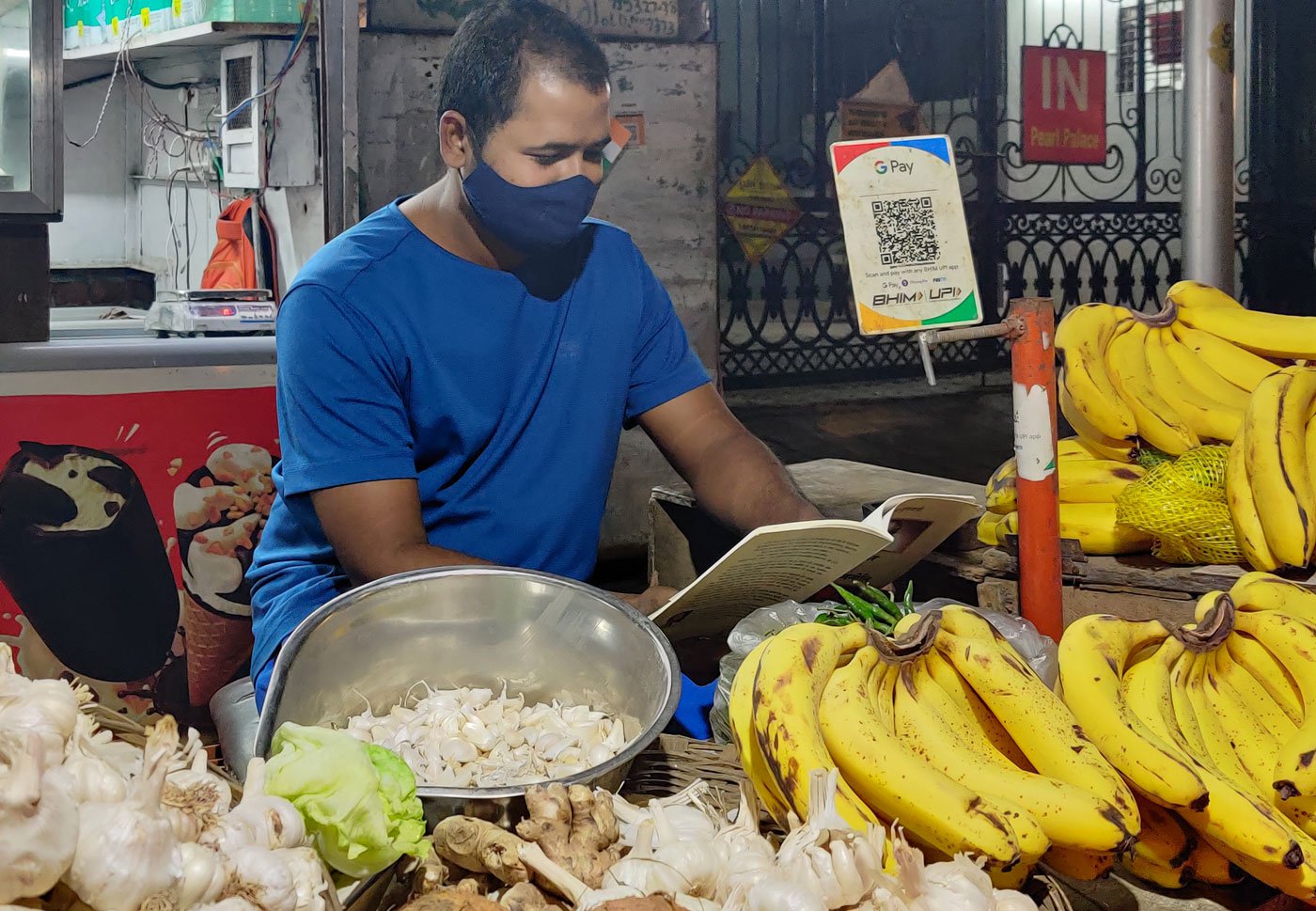
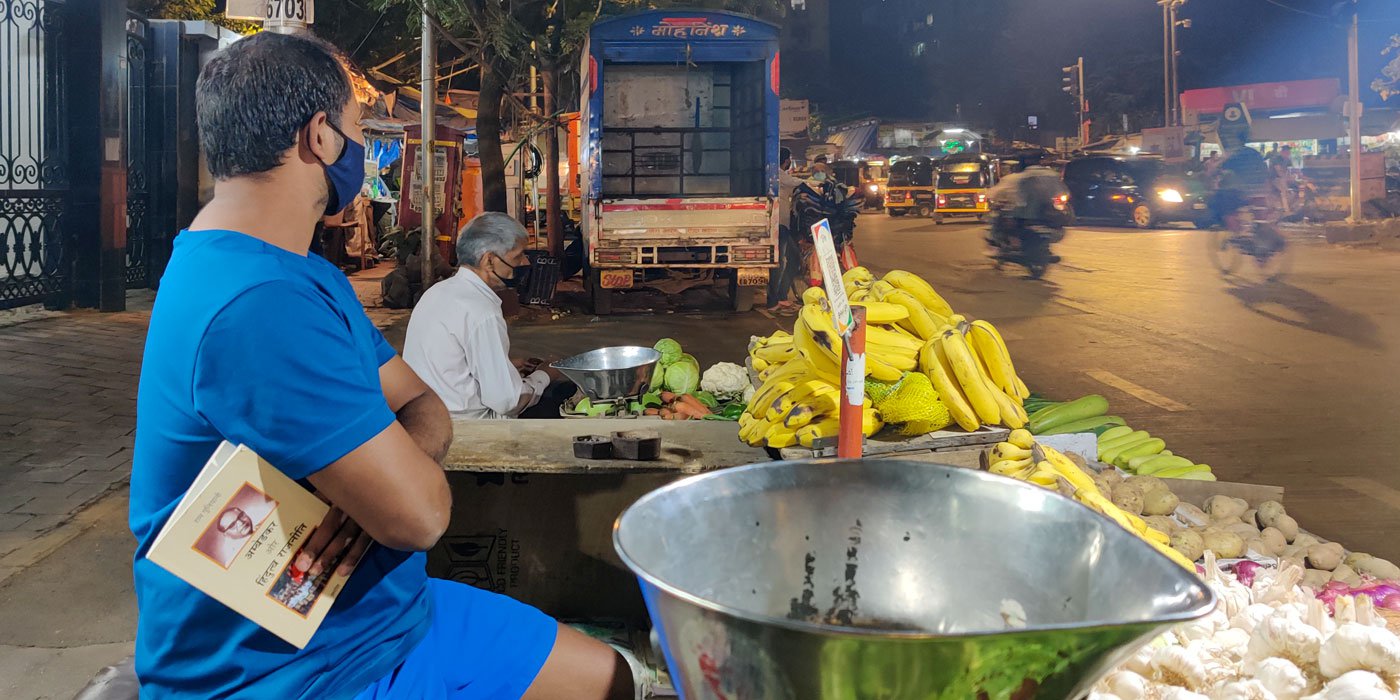
Mithun reads in between attending to his customers. "The advantage of reading a lot was that I started wanting to write."
He has been writing on social media for over seven years and has a loyal following of readers
I met Anwar Hussain at the same protest. He started coming by the shop to buy vegetables. He left some books for me when he came to know that I liked to read. Most of the books were by Manto, Bhagat Singh and Munshi Premchand. Manto shook me in a way that I started changing my attitude towards women. After reading Bhagat Singh, I asked myself if today’s India was the same India of Bhagat Singh’s dreams. Reading Munshi Premchand made me feel like I was seeing my own life, my people, and my society. Then I started reading Harishankar Parsai. His writing moved me in such a way to change society and myself that I often wished this person were here now – he would have exposed everyone.
The hatred I felt towards a community, gender, region or race was evaporating now. The advantage of reading a lot was that I started wanting to write. On Facebook, when I read the posts of some famous writers, the writing felt pretentious. I began to feel I should express my views, and started writing my own experiences as stories on social media. Readers started connecting with me. I was following some good writers too. The process of learning continued.
*****
There was no
mangalsutra
, no
kanyadaan
and no dowry at our wedding.
I put sindoor on Dolly’s forehead and she did the same in return.
I work on the street, so I’ve experienced countless instances of police excess. Extortion, abuse, hauling us to the police station and keeping us there for hours, randomly charging us fines of 1250 rupees… So much of this has happened that if I started writing, I could fill up the pages of a big fat book. How many policemen have beaten me up or threatened to do it. When I’ve refused to pay hafta [protection money], they have put me in the police van and dragged me through the city for hours. All this is normal. It was afraid to write about these experiences on social media, but I’ve written them without mentioning the policeman’s name, or the city or state. After demonetisation, senior journalist and filmmaker Rukmini Sen noticed my writing and invited me to write for Sabrang India, which I continue to do.
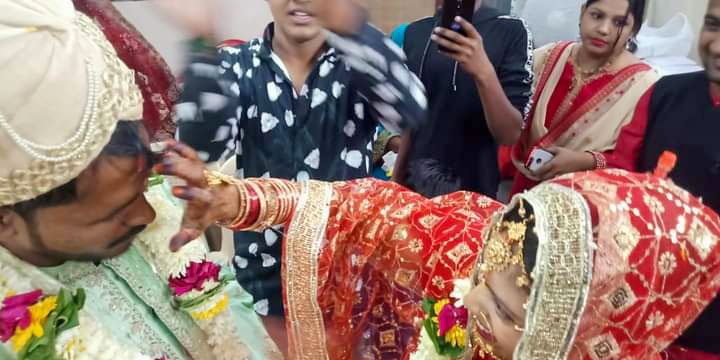
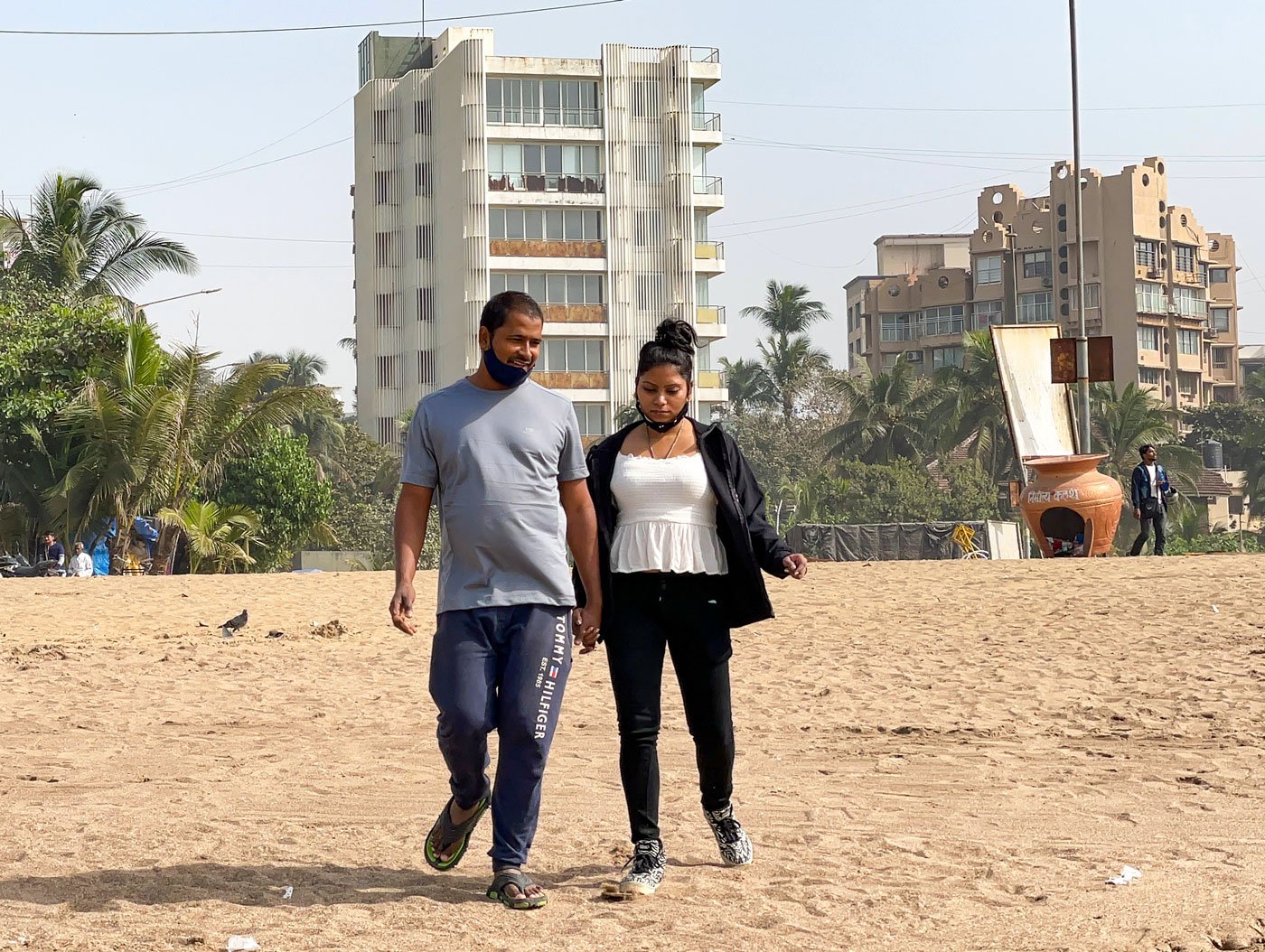
Dolly applying sindoor on Mithun's forehead (left) at their wedding in 2019. In their wedding vows, the couple promised each other equality between them
In 2017, my second sister was also married off. I started being pressured to get married too. This much was clear to me, that an important decision like marriage must not be taken under social pressure. Dolly came into my life in this period. We spent time together, which often bothered people. They would ask all sorts of questions like “Who is she? To which caste does she belong?” Those born into my caste were the most interested in finding out her caste. Her being from a different caste would put their noses out of joint. But I had risen above all this.
Dolly told her family about me, and I went and met her parents after a few days. My family wanted us to get married as soon as possible. Dolly and I were keen to marry too, but after we had settled down a bit. Two to two and a half years went by, and now Dolly’s parents started pressuring her. They were the parents of the girl, after all, and the social burden on them was of a different kind. They wanted to arrange a traditional wedding. My family wanted the same thing. But I wanted a court marriage, and Dolly wanted that too. Her parents were afraid that I would leave their daughter and run away. My parents felt people should know that their son had married. We had to arrive at a decision in the midst of these anxieties. Then her side arranged the wedding in a small hall.
But our families had to give in to our insistence. There was no mangalsutra , no kanyadaan and no dowry at our wedding. I put sindoor on Dolly’s forehead and she did the same in return. We walked the saat phere [seven rounds around the fire]. The priest would chant his mantra , and after each round Mayank would read out our vows. We promised each other there would be equality between us. The guests gathered in the hall were amused but realised that they were witnessing something different, and the shackles were coming lose. Some people were upset. But it was more important to us that the long-held traditions of inequality, Brahminism, and anti-women rules were broken. Dolly and I shifted to a new house after getting married. It was bare when we got married in 2019. We started collecting the basic necessities slowly. Right from a needle to an almirah , we bought everything with our hard-earned money.
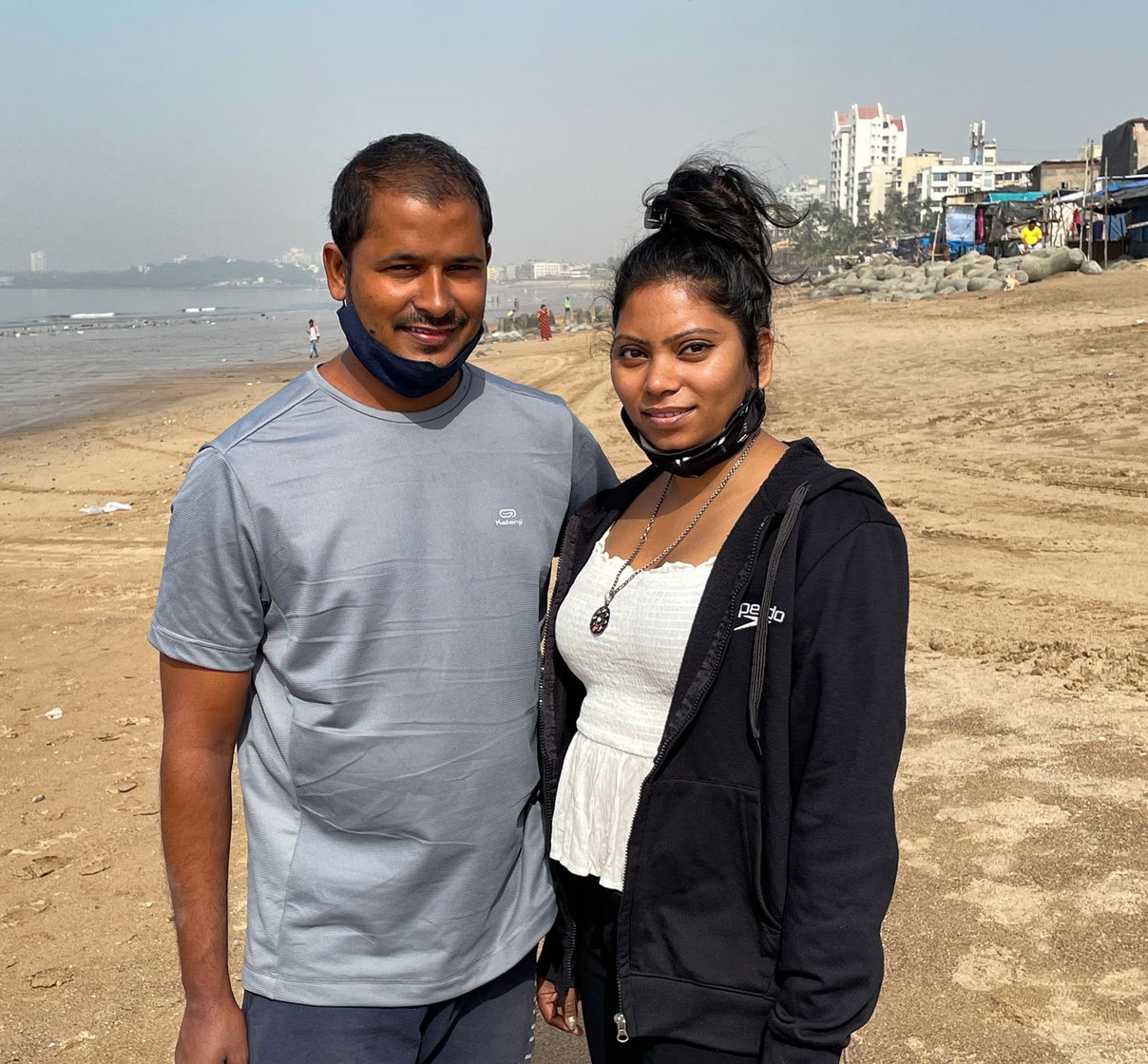
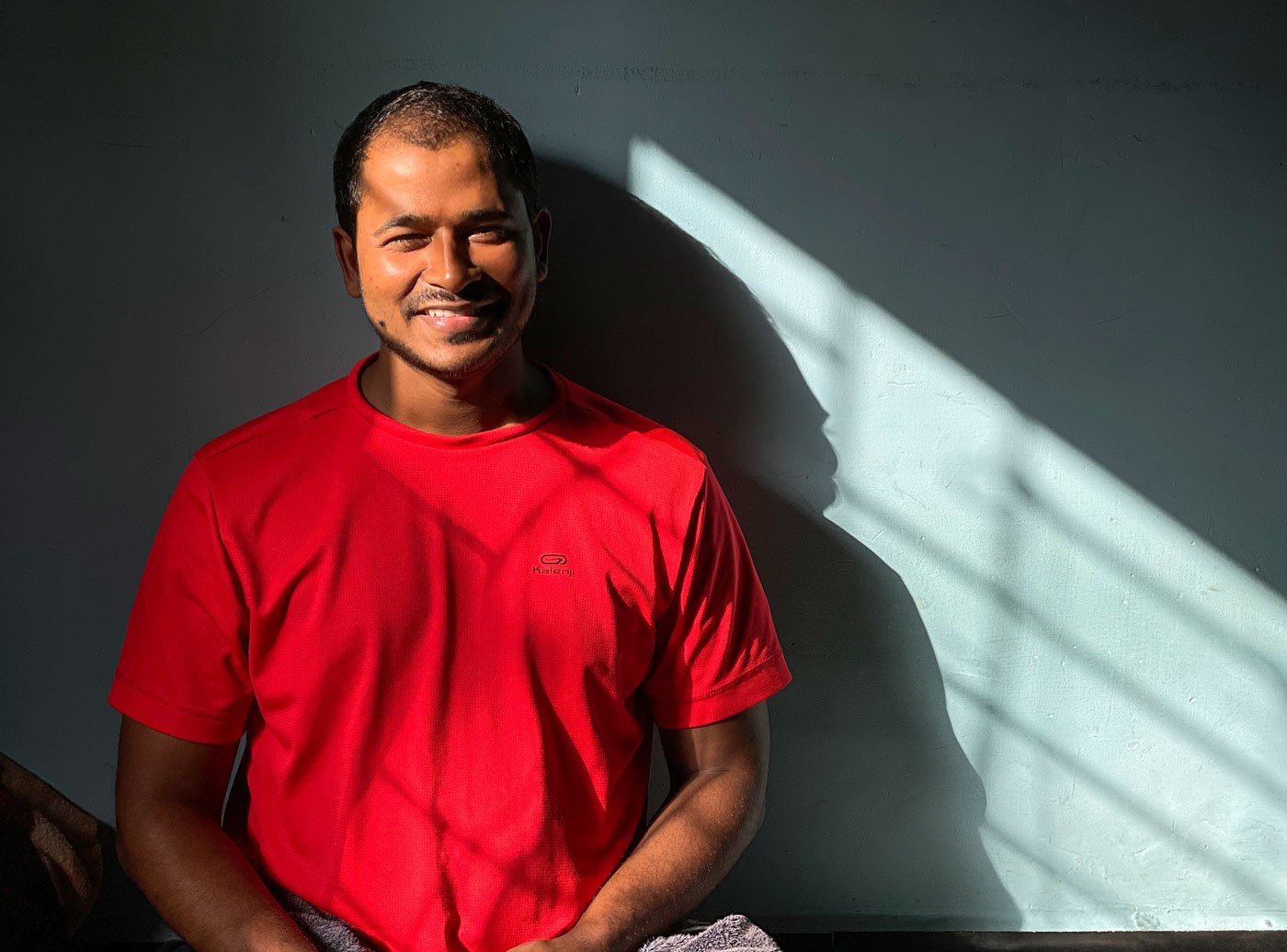
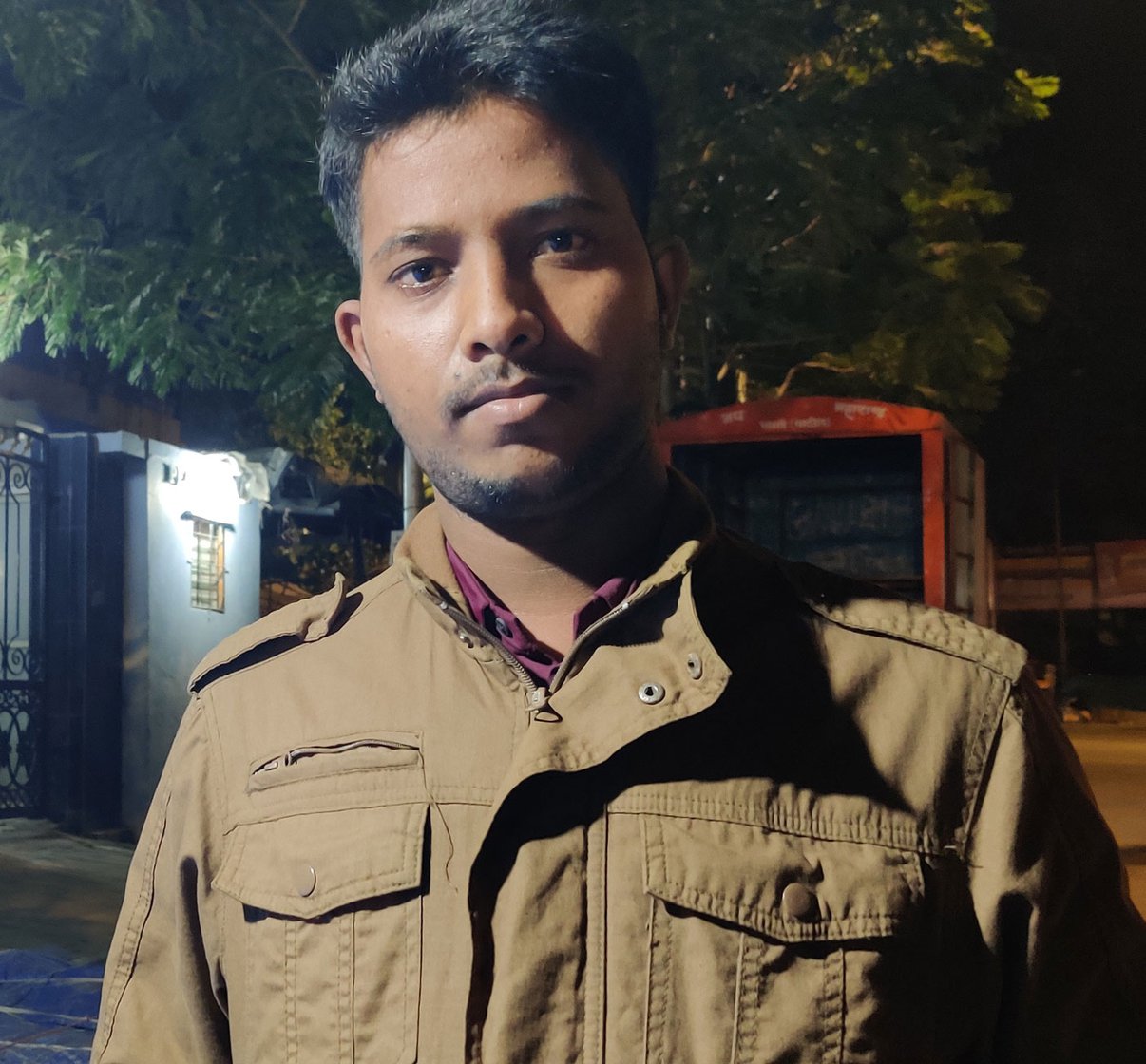
Left: Mithun and Dolly stayed on in Mumbai through the Covid-19 lockdown. Centre: "We will struggle with life," says Mithun. Right: His brother Ravi
In March of 2020, when the coronavirus came knocking, and lockdown was imposed, people were rushing to buy essentials. My shop was emptied of all the vegetables within minutes. Some people stole, only some paid for them. It was the same situation everywhere. The police shut down our shops in no time. There was no word on when we could reopen. People started fleeing to their villages and hometowns. The building we were in emptied out in just two days. The exodus had less to do with corona and more to do with not knowing what to eat without any source of income. Dolly worked in a store that sold trekking jackets. That had also shut, on March 15, 2020.
My family was insisting we come home and then decide when things improved. But our position was such that we did not have any savings. So it seemed better to stay on. I worked with vegetables, and so was allowed to work. But procurement was a major difficulty. The main market in Dadar was locked. We could get them at places like Chuna Bhatti and Somaiya Ground, off the highway. But these places were crowded and I was scared of contracting the virus. I didn’t want to pass it on to Dolly at home. But there was no option than to go into the crowd – we were barely meeting our expenses. In May [2020], the municipal corporation – BMC – restricted shop opening time to three hours, from noon to 3 p.m. If you went over that even a little, the police would start raining blows with their batons. Online portals selling vegetables were open from morning to late at night, and people found it easier to order from them. So my business was badly affected. It was during this time that dada fell and broke his leg. I’ve already told you how he died during the lockdown.
The shop opening time was extended to 7 p.m. after a few months. One evening, my younger brother Ravi was picking out rotten mangoes from the cart. A policeman came and started videoing him. Ravi panicked and tried to bribe him, but he demanded a huge sum and threatened to file a case. He took Ravi to the police station. After midnight, at around 1 or 1:30 a.m., a policeman pulled out 6,000 rupees that were in Ravi’s pocket, and let him go. It was all the money he had – those were his savings. A couple of days later, we informed a senior police officer about the incident through someone we knew. And two days after that, the same policeman came looking for Ravi and returned the whole amount.
Business has not improved since the pandemic started until now. We are still struggling to get our lives back on track while battling the world. As I write this piece, I am corona-positive. Dolly is, too. We’ve locked ourselves up in the house. The other vendors near my shop helped sell my remaining stock. A little money we had in hand was spent on medicines and getting tested for corona. But it’s okay. Once we test negative, we will step out then. We’ll try again. We’ll struggle with life. What else is the option?
Some people and places have not been named to protect privacy.
This story was originally written in Hindi by the author, and edited by Devesh.
Cover photo by Sumer Singh Rathore.
This story is part of a series of 25 articles on livelihoods under lockdown, supported by the Business and Community Foundation.
